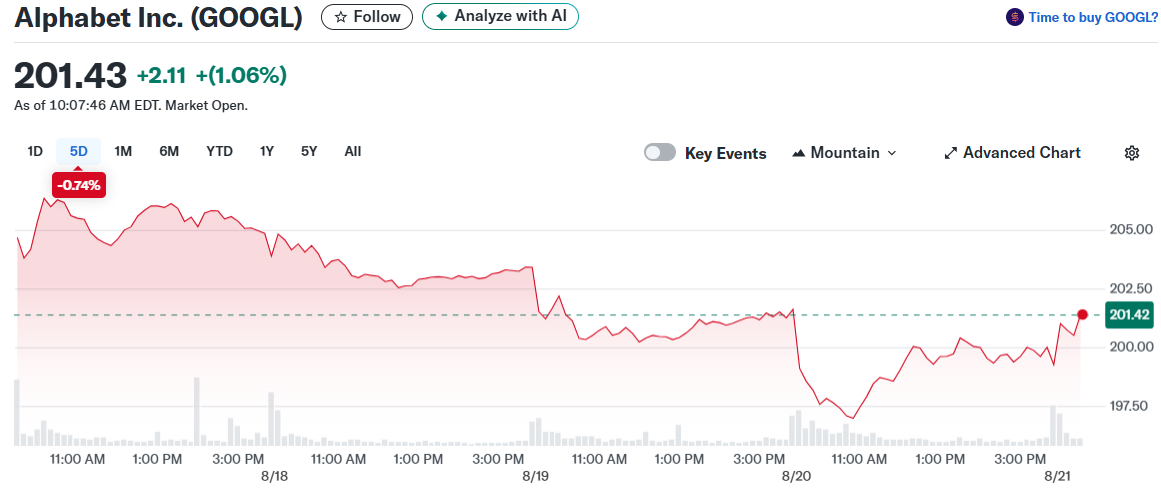TLDR
- Google unveiled the Pixel 10 lineup on August 20, featuring four phones including a foldable model, with prices starting at $799
- The devices feature Google’s new Tensor G5 processor and Magic Cue AI technology that pulls contextual information across apps
- Google took shots at Apple during the launch, highlighting faster AI integration compared to delayed iPhone updates
- The Pixel 10 Pro Fold costs $1,799, undercutting Samsung’s Galaxy Z Fold 7 by $200
- Google holds just 3% of the U.S. smartphone market compared to Apple’s 49% share
Google dropped its latest smartphone arsenal on Wednesday, unveiling the Pixel 10 series at its Made By Google event in New York City. The tech giant didn’t hold back, taking direct aim at Apple’s slower AI rollout while showcasing four new devices packed with artificial intelligence features.

The Pixel 10 family includes the standard Pixel 10, Pixel 10 Pro, Pixel 10 Pro XL, and the eye-catching Pixel 10 Pro Fold. Prices start at $799 for the base model and climb to $999 for the Pro version.
Google’s timing seems calculated. The company openly criticized competitors for “broken promises” regarding AI integration, a clear jab at Apple’s repeated delays with Siri updates.
Hardware Specs and Pricing Strategy
The entry-level Pixel 10 now sports three rear cameras, up from two in previous models. Google added a 5x telephoto camera to sweeten the deal. The 6.3-inch device runs on Google’s latest Tensor G5 processor with 12GB of RAM and up to 256GB of storage.
The Pixel 10 Pro bumps up the specs with 16GB of RAM and up to 512GB of storage. It keeps the same 6.3-inch display size but adds more advanced camera capabilities.
Google’s Pixel 10 Pro XL matches the Pro’s specs but stretches to a 6.8-inch display. All three phones promise over 30 hours of battery life.
The star of the show might be the Pixel 10 Pro Fold. This book-style foldable phone features a 6.4-inch front display and opens to reveal a massive 8-inch screen. Google redesigned the hinge mechanism to make it water and dust resistant.
At $1,799, the Pro Fold undercuts Samsung’s Galaxy Z Fold 7 by $200. That pricing move could shake up the premium foldable market.
Magic Cue AI Technology
Google’s new Magic Cue software represents a genuine leap forward in smartphone AI. The system recognizes conversation context and pulls relevant information from multiple apps without user prompts.
When a friend texts about dinner plans, Magic Cue automatically suggests replies with reservation details from Gmail. During airline calls, it displays flight information on screen without manual searching.
The Weather app gets smarter too. If users save a Yellowstone trip in their Calendar, the weather app provides trip-specific forecasts and outdoor equipment tips.
Google promises Magic Cue processes everything locally. The data stays in a secure enclave on the phone rather than traveling to cloud servers.
Market analyst Marques Brownlee called these features potentially game-changing. He compared Magic Cue’s impact to how call screening previously attracted Pixel users.
Market Position and Competition
Google faces an uphill battle in market share. The company holds just 3% of the U.S. smartphone market compared to Apple’s commanding 49%, according to Canalys data. Pixel devices aren’t even available in China and several other major markets.
Stifel analyst Mark Kelley praised Google’s presentation strategy. He noted how the company effectively highlighted key differences from Apple devices, positioning Gemini AI as the central advantage.
However, smartphone users rarely switch platforms. The Pixel 10’s impact on Apple’s market dominance will likely remain limited, especially with iPhone 17 models expected this fall.
The Pixel 10 series might serve a different purpose entirely. These devices showcase Google’s AI capabilities for Android partners like Samsung Electronics, which already uses Gemini as the default assistant.
Creative Strategies analyst Carolina Milanesi sees Pixel as Google’s most effective stage for demonstrating Gemini’s potential. She believes the phones help establish Google’s long-term AI strategy.
Google also unveiled the Pixel Watch 4 alongside the smartphones. The smartwatch features a domed display, 25% better battery life, and emergency satellite communication capabilities. Pricing starts at $349 for the 41mm version.
The devices become available on August 28, giving Google a head start before Apple’s expected fall iPhone launch.






